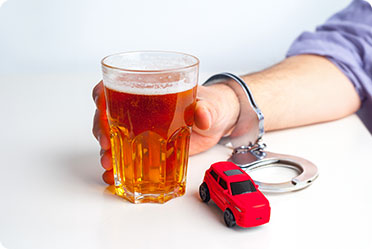
Is a DUI Different from a DWI?
No. Most states have different terminology for drunk driving statutes. A Pennsylvania DUI is essentially the same as a New Jersey DWI. There are some differences between the wording of the PA and NJ laws against drunk driving and the penalties. However, a Pennsylvania DUI conviction will be viewed the same as a New Jersey DWI conviction in either state.
Is the One Drink Per Hour Rule Reliable?
No. Don’t rely on the “rule” of one drink an hour. Generally, one drink should be absorbed and eliminated from the human body in one hour. Nonetheless, more than one client of mine has reported that this “rule” was followed before being arrested for a DUI. In reality, alcohol metabolism is a complex process that is dependent on many variables, such as gender, body weight, body hydration, and food content in the stomach. Other factors, such as recent gastric bypass surgery and certain diets, will unexpectedly increase a person’s BAC (blood alcohol concentration).
Is Driving the Same Route Home from the Bar Each Time Safe?
No. Being close in proximity to your home or traveling the same exact route home does not increase your chances of not being stopped by a police officer. Once again, I have heard from many clients that they were located less than a mile from their homes when stopped and arrested for a DUI or DWI. The police will not cut you a break because you live nearby.
Is There a “Safe Harbor” Defense for Pulling Over After Realizing You May be Intoxicated?
No. Even though a person should probably be rewarded for doing the right thing by pulling over immediately after realizing he or she is unsafe to drive, the laws in New Jersey and Pennsylvania do not recognize such behavior as a defense.
What if I was Just Sleeping in a Car?
Police officers commonly come across drivers who are sleeping in their cars until they become sober. Often, a driver has turned on the ignition in order to listen to music or use the heater/air conditioner before falling asleep. The police will likely charge the driver with a DUI. In these cases, the prosecution may assert that the driver had operated the vehicle prior to encountering the police, intended to operate the vehicle or was in control of the vehicle while in an intoxicated state.
A knowledgeable DUI attorney will argue certain exceptions in the law concerning these circumstances; disputing that the person “operated” or “intended to operate” the vehicle while intoxicated. Nonetheless, the best bet is to entirely stay away from a vehicle when you are intoxicated.
Does Not Being Read Your Rights Mean a Dismissal of a DUI Charge?
Probably not. The Supreme Court ruled in Miranda v. Arizona that a person who is arrested must be advised of the right to remain silent and the right to consult with an attorney before speaking to the police. These rights are commonly known as “Miranda rights.”
A police officer can ask a driver who is not under arrest any question without advising that driver of the Miranda rights. Once a driver is arrested, then the police must provide the Miranda rights before asking questions that could call for incriminating answers. In other words, the police do not have to give an arrested driver Miranda rights if no questions are asked or those questions do not address the suspected criminal activity.
If a police officer asks questions that elicit incriminating answers from a driver and Miranda rights were not first provided, then those answers may be ruled inadmissible as evidence.
Is Refusing to Provide Breath or Blood a Good Way to Avoid a DUI/DWI Charge?
Refusing to give a breath or blood sample is usually a bad idea. There is a common myth that a driver has a better chance of “beating” a DUI charge by refusing to give a breath or blood sample following an arrest for drunk driving. Many years ago this type of advice may have worked, but times have changed. The penalties for refusing are harsh and may get even tougher.
The bottom line is that there are substantial penalties for a refusal conviction. There are rare circumstances when refusing can be better for your case. However, knowing when to refuse is a complicated issue that requires an extensive knowledge of the law. Furthermore, refusal charges are extremely difficult to fight. In the end, you may be hurting more than helping yourself by refusing.
Additionally, the New Jersey Senate has recently written legislation that will call for jail sentences for Refusal convictions and count them as prior DWI convictions. This new DWI legislation is expected to become the law soon.
These are only a few of the common DWI myths. For the most part, following these myths will lead someone into finding trouble with the law, rather than avoiding it. In the end, it is best not to take legal advice from people who claim to already have been through the process or insist that they know how to “beat” a DWI.
Leckerman Law focuses on safeguarding the
rights of individuals charged with DUI, DWI, DAI, and
other alcohol-related criminal offenses - Call Us Now For
NJ DWI (856) 429-2323 | For PA DUI (215) 496-9292